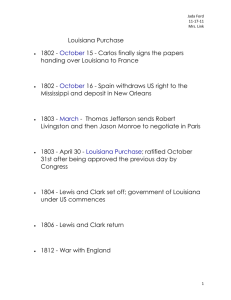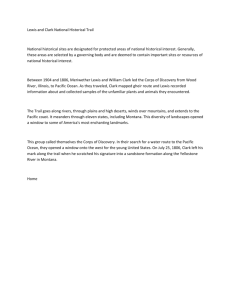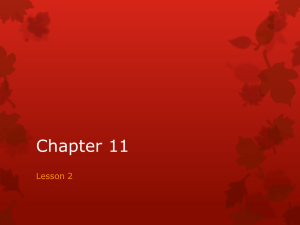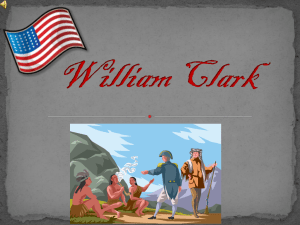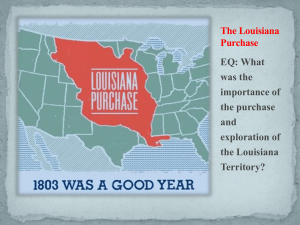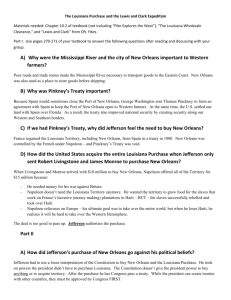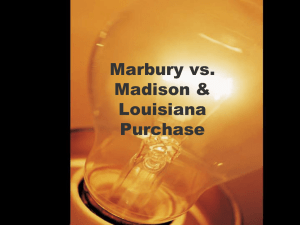Louisiana Purchase: Lewis & Clark Exploration Worksheet
advertisement
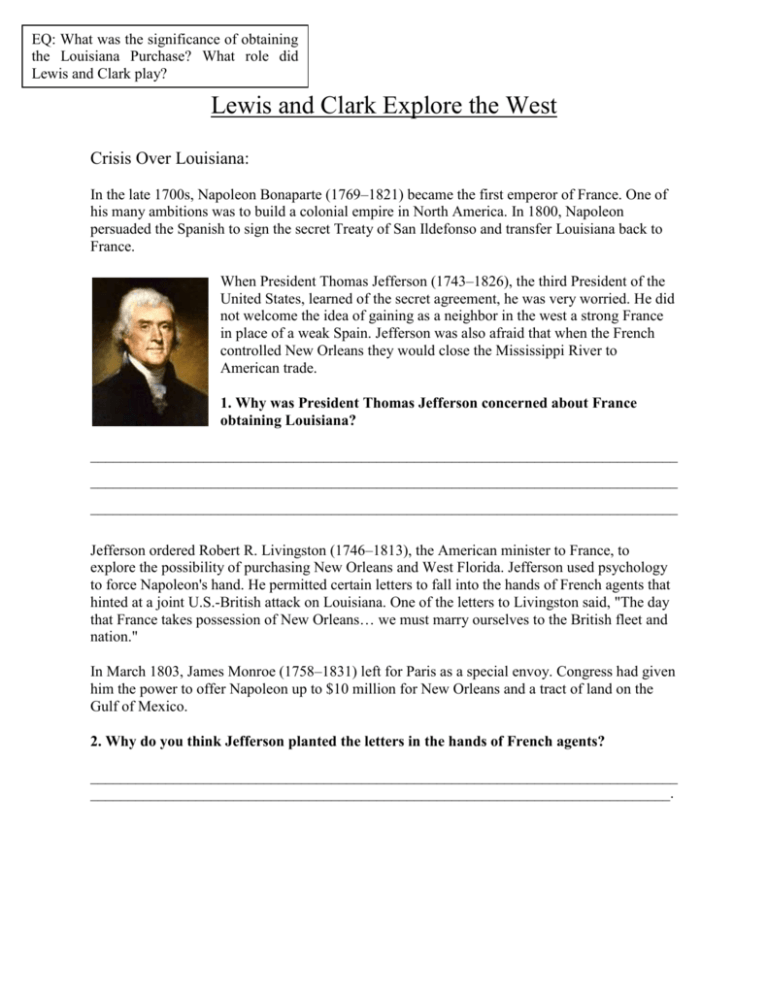
EQ: What was the significance of obtaining the Louisiana Purchase? What role did Lewis and Clark play? Lewis and Clark Explore the West Crisis Over Louisiana: In the late 1700s, Napoleon Bonaparte (1769–1821) became the first emperor of France. One of his many ambitions was to build a colonial empire in North America. In 1800, Napoleon persuaded the Spanish to sign the secret Treaty of San Ildefonso and transfer Louisiana back to France. When President Thomas Jefferson (1743–1826), the third President of the United States, learned of the secret agreement, he was very worried. He did not welcome the idea of gaining as a neighbor in the west a strong France in place of a weak Spain. Jefferson was also afraid that when the French controlled New Orleans they would close the Mississippi River to American trade. 1. Why was President Thomas Jefferson concerned about France obtaining Louisiana? ______________________________________________________________________________ ______________________________________________________________________________ ______________________________________________________________________________ Jefferson ordered Robert R. Livingston (1746–1813), the American minister to France, to explore the possibility of purchasing New Orleans and West Florida. Jefferson used psychology to force Napoleon's hand. He permitted certain letters to fall into the hands of French agents that hinted at a joint U.S.-British attack on Louisiana. One of the letters to Livingston said, "The day that France takes possession of New Orleans… we must marry ourselves to the British fleet and nation." In March 1803, James Monroe (1758–1831) left for Paris as a special envoy. Congress had given him the power to offer Napoleon up to $10 million for New Orleans and a tract of land on the Gulf of Mexico. 2. Why do you think Jefferson planted the letters in the hands of French agents? ______________________________________________________________________________ _____________________________________________________________________________. The Sale and Transfer of the Louisiana Purchase Napoleon needed money to finance a war he was planning against Great Britain, and he feared that once that war began, the United States would take advantage of the situation and try to seize Louisiana. Thus, Napoleon decided to sell Louisiana rather than fight for it. A treaty dated April 30, 1803, and signed May 2 sold Louisiana to the United States for about $15 million. The area stretched from the Mississippi River in the east to the Rocky Mountains in the west and from the Gulf of Mexico in the south to the Canadian border in the north. At first Jefferson did not know exactly how to take the surprising news. The Constitution said nothing about acquiring foreign territory. But popular enthusiasm for the purchase swept his doubts aside. 3. Using your previous knowledge about Thomas Jefferson, what was his political party and their beliefs about the power of the national government? Why would he be concerned about the fact the Constitution said nothing about acquiring foreign territory? ______________________________________________________________________________ ______________________________________________________________________________ ______________________________________________________________________________ _____________________________________________________________________________. The Expedition Americans were very excited about this new territory but it was also a mystery. Very few white people had traveled to this western part of the country and the few maps that existed were patchy and unreliable. President Jefferson decided to hire a group of men to explore this new America. Jefferson's first choice to lead the expedition was his trusted secretary, Meriwether Lewis, who then asked his friend William Clark to share the command. Both men had been officers in the U.S. army and had some experience traveling through wild country, but no one had ever attempted a journey like this one. First, Jefferson asked Lewis and Clark to explore and map the unexplored territory, especially the Missouri River and its tributaries, streams that flow into a larger river. Secondly, Jefferson asked Lewis and Clark to observe, record, and collect specimens of the local plant and animal life. The President wanted to know what natural resources existed for future American pioneers to live on. Finally, Jefferson asked Lewis and Clark to seek out the Native American tribes, study their languages and customs, and make friends with them if possible. Jefferson wanted the Native Americans to think of him as their new "father." Ironically, Lewis and Clark would be more like children, dependant on the help and kindness of the Native Americans. Lewis and Clark recruited other men to join them; they called themselves the "Corps of Volunteers on an Expedition of North Western Discovery," but that name became tiring to say and they shortened it to the "Corps of Discovery." When the Corps of Discovery paddled away from Camp Wood Missouri, they did not know that they would be gone for two and a half years, that they would travel almost eight thousand miles, and that they would be participating in one of the greatest adventures in American history. 4. What three things did Jefferson ask of Lewis and Clark on their journey to explore the newly acquired Louisiana Purchase? ______________________________________________________________________________ ______________________________________________________________________________ ______________________________________________________________________________ _____________________________________________________________________________. 5. What do you think Jefferson meant when he said he wanted the Native Americans to view him as their new “father.” ______________________________________________________________________________ _____________________________________________________________________________. Lewis and Clark: Ambassadors of Good Will Lewis and Clark encountered many different Indian tribes on their expedition. Most of the tribes Lewis and Clark encountered were little known in the United States. Many of these tribes, in fact, had become friends with France, Spain, and England before the United States had become a country. It was very important to gain the loyalty and friendship of these tribes for economic as well as military and political reasons. Therefore, President Jefferson instructed Lewis and Clark to make friends and develop trade relations with these Indians as well as collect scientific and military information about them. Lewis and Clark fulfilled their roles as ambassadors of good will to perfection. Whenever they encountered a band of Indians, the captains held a conference, distributed presents, and explained to them that they now owed their allegiance to the United States, not France, Spain, or England. 6. Why would Jefferson want to collect scientific and military information about the Natives?___________________________________________________________________ __________________________________________________________________________. A Chain of Friendship The Corps of Discovery succeeded because of the help of the Indian peoples met along the way. Imagine a chain--its links Indian communities--that stretched from the Mandan villages on the upper Missouri across the Rockies and then along the Columbia River to the Pacific coast. For Lewis and Clark this chain of friendship was a lifeline that enabled them to pass safely through a strange and unknown landscape. The Corps benefited from the protective custody they enjoyed while within the territory occupied by each tribe they visited. From the Indians the explorers received food, an opportunity to rest, and advice about the route immediately ahead. One reason the various tribes were so helpful to Lewis and Clark may have been their Indian companion, Sacagawea, and her infant son. This Shoshone woman, married to a French trader, accompanied the Corps of Discovery from the Mandan villages to the Pacific Ocean and then came back with them. Despite traveling with a newborn child during the trek, Sacagawea proved to be helpful in many ways. She was skilled at finding edible plants. When a boat she was riding on capsized, she was able to save some of its cargo, including important documents and supplies. She also served as a symbol of peace - a group traveling with a woman and a child were treated with less suspicion than a group of men alone. Indians who might have suspected the explorers were on a warlike mission would have been reassured by seeing Sacagawea and her child with the soldiers. 7. Why was Sacagawea so valuable to the Corps of Discovery on their expedition? ______________________________________________________________________________ ______________________________________________________________________________ _____________________________________________________________________________. Native People and Geographical Knowledge Of particular benefit to the expedition was the geographical information obtained from the Indians they encountered. For example, on August 14, 1805, at a critical juncture of the expedition, Lewis wrote in his journal: "I now prevailed on the [Shoshone] Chief to instruct me with respect to the geography of his country. This he undertook very cheerfully, by delineating the rivers on the ground." He did this, Lewis noted, by placing "a number of heaps of sand on each side which he informed me represented the vast mountains of rock eternally covered with snow which the river passed." 8. Jefferson gave Lewis and Clark three main instructions: Explain how Native American tribes helped to accomplish these goals. ______________________________________________________________________________ ______________________________________________________________________________ ______________________________________________________________________________ _____________________________________________________________________________. The expedition contributed significant geographic and scientific knowledge of the West, aided the expansion of the fur trade, and strengthened U.S. claims to the Pacific. Clark’s maps portraying the geography of the West, printed in 1810 and 1814, were the best available until the 1840s. Not all results of the expedition can be considered positive. The western Native American tribes were exposed to a large small pox epidemic. Economic, political, military, and social forces brought to bear as a result of the expedition forever changed the northern plains that the Native Peoples had known, and would also forever change those who came to the prairie. No American exploration looms larger in U.S. history. WRITING TASK: Now that you have read about the importance of the Louisiana Purchase and the expedition of Lewis and Clark and their Corps of Discovery, you will take on the role of Thomas Jefferson. On a separate piece of paper, or on the back of this packet, you will write a letter to the American people after the completion of the expedition. Your letter should justify your purchase of the Louisiana territory from France and explain what you hoped to accomplish by sending Lewis and Clark out west. To be included: -Why you wanted the Louisiana territory. -What political/philosophical conflict did you have to overcome to proceed with the Louisiana Purchase? -What were your goals for Lewis and Clark and how were these goals carried out? -Your position on dealing with Native Americans. -How successful do you believe the journey was, and why? **Remember, this is letter to the American people. You are trying to convince them that what you, Jefferson, did was the right move. Do not simply answer the questions. You must persuade Americans that this was the best way to go about expanding and exploring.
